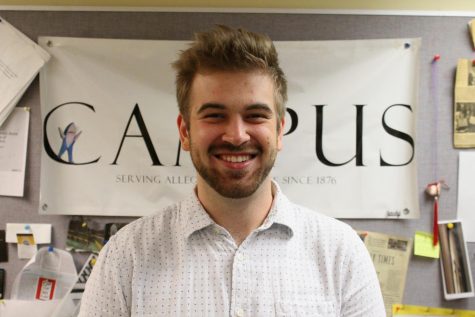President Hilary Link announces administration changes
College expands Office of Institutional Diversity and moves Title IX
President Hilary Link announced her organizational realignment prior to the start of module two classes. The restructuring comes 19 months into her presidency.
Link said that multiple global crises have occurred over the past year. After engaging in thousands of conversations with students, faculty, staff and alumni, Link decided a realignment of the administrative structure was necessary.
“Instead of a year-long strategic planning process, I wanted to start my own plan,” Link said, “to arrange organizational structures towards these priorities.”
Changes will occur between now and until the end of June, when the 2021-2022 academic year officially begins.
The plan focuses on four main pillars, with the foundation being “Holistic Student Success and Inclusive Excellence.” Link quoted Dean of Curriculum and Registrar Ian Binnington in saying they want to create “a structure that will enable the best student experience at Allegheny to be the typical student experience at Allegheny.”
“Allegheny is very student-focused,” Link said, “but one of the things we’ve heard, especially from marginalized groups, is that there are too many points reaching out for help. They’re scattershot, not cohesive and people don’t know who to reach out to.”
Link plans to add two staff members to the President’s office, including a Chief of Staff and an ombudsperson. An ombudsperson acts as a part-time staff member for concerns from students, faculty and staff.
The plan also moves Susan Salton from College Relations to a position as Link’s Strategic Communications Advisor. College Relations will eventually move under the Vice President for Enrollment Management. Meg Ryan is the interim Vice President, replacing Cornell LeSane who joined the College of the Holy Cross in January. In addition, Dean for Institutional Diversity Kristen Dukes will now report directly to the President.
“(Diversity, equity and inclusion are) very important to the institution and to me, and it needs to report to the president to be more effective,” Link said.
Link hopes that simplifying and reorganizing the current administrative structure will create more defined paths for students who are trying to reach out with issues.
“We want to better leverage the work that separate departments do to create synergies between them,” Link said.
While currently tentative, Link explained that moving Title IX to Dean of Student Life April Thompson’s portfolio is one such synergy.
“Title IX currently reports to the president and kind of floats out on its own because we struggled to find its best fit,” Link said. “An external person doing a review of our offices saw it fitting best in Student Life.”
According to Link, students find Title IX lacking a necessary support element — a concern she hopes would be alleviated by this transition.
Link also plans on implementing class deans, who will serve as a secondary academic advisor and point people for issues relating to the class they are assigned. Under the plan, there would be a first-year class dean, a sophomore class dean, a junior and senior class dean and a case management dean.
“In some models, class deans travel with the class they are assigned,” Link said, “but in the model we’re using — the model I’m most familiar with — class deans are experts in that year’s leadership.”
The class deans will work in tandem with the Dean of Student Life and the Dean of Student Success, a new role which will be filled by Ian Binnington, who will be leaving his position as Dean of Curriculum and Registrar.
“They’re an additional safety net to ensure students aren’t falling through the cracks,” said Matthew Stinson, Vice President for Institutional Affairs.
Link and Stinson hope the extra support provided by the class deans help increase the student retention rate — a primary goal of Link’s new model.
“I think the college has put a tremendous amount of effort into retention,” Link said. “The problem is, when students need help, they don’t know who the central person is because of so much outreach. We want to simplify that for our students, and increase belonging as a class.”
Student retention has been improving over the past few years, Link indicated, but it has been an issue for the college. Link attributed the issue to financial reasons as well as students’ inability to find a sense of belonging or community at Allegheny.
The plan is also focused on financial stability. Link explained that a “demographic cliff” is expected to occur within the next few years as the number of college students is poised to drop rapidly due to fewer college-aged students graduating from high schools. This, paired with financial struggles of small liberal arts colleges, as well as the COVID-19 pandemic, have made Link seriously consider financial stability.
Link said the plan is to generate new sources of revenue, improve the low retention rate, create new programs and courses and spend less money.
Link’s model also focuses on “owning” Allegheny’s distinct academic brand.
“(One of the issues with Allegheny’s ranking) is that we aren’t able to articulate what’s special about us,” Link said.
This initiative culminated with the College’s rebranding campaign in September with the new slogan, “Learn Outside the Lines.”
“This is not anything new,” LeSane told the Campus in September. “This is really to help tell the story that we have been too humble to tell before. That story is that we really are a gem of a school, but that has been hidden from the world for a while now. We want to make sure that is no longer hidden.”
Another pillar of Link’s strategic realignment is Allegheny’s relevance to global, regional, local and social contexts. Link hopes Allegheny can become a major economic driver and an anchor institution for the City of Meadville and greater Crawford County with additional focuses on diversity, equity and inclusion as well as climate action.
Link created the Meadville Economic, Civic and Community Engagement office under Stinson, who will now also oversee Career Engagement. The college hired Meadville City Manager Andy Walker, ’00, as the first Executive Director for Economic, Civic and Community Engagement.
In a press release from the college, Walker said, “Allegheny has a longstanding and demonstrated commitment to civic engagement and service learning, built upon a legacy of volunteerism. I’m excited to leverage Allegheny’s strengths and combine them with Meadville’s can-do spirit to also strengthen the economic success of our community.”
The MECCE office will also oversee Innovation and Industry, which will focus on partnering students with local companies and encouraging companies to hire Allegheny graduates.
“(This will) build upon multidisciplinary education with specific skill-based work to create perfect employees for local industries,” Link said.
Under Link’s plan, there will also be a new Center for Teaching and Learning, which will consist of the office for Undergraduate Research, Scholarship, and Creative Activities, INTDS courses, faculty diversity — which focuses on increasing faculty diversity — and faculty development.
Link and Stinson hope the changes will create more transparent point-people in the administration and better open up lines of communication between the administration and students.
“It was surprising to us how little information was getting back to students,” Link said.
They hope that by emphasizing student support, more successful opportunities will be generated for students, alumni, faculty and the surrounding community.
“We clearly need to close the gaps,” Stinson added, “and with this new model, there are more touchpoints for students.”

Ethan Woodfill is a senior from Pittsburgh, Pennsylvania. He is an Environmental Science & Sustainability and Political Science double major with an...

Roman Hladio is a senior from Wexford, Pennsylvania. He is studying English with a creative writing emphasis, and completing requirements for a Journalism...









Alum • Feb 27, 2021 at 10:11 am
Lay off and don’t renew faculty contracts, cut programs, cut student focused needs. Hire two new staff members for the President. The Allegheny way.